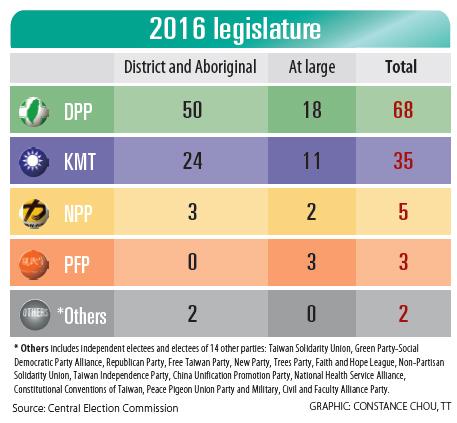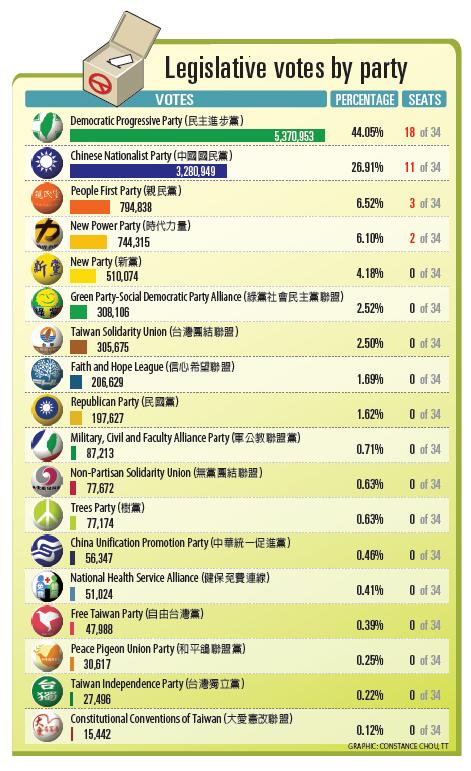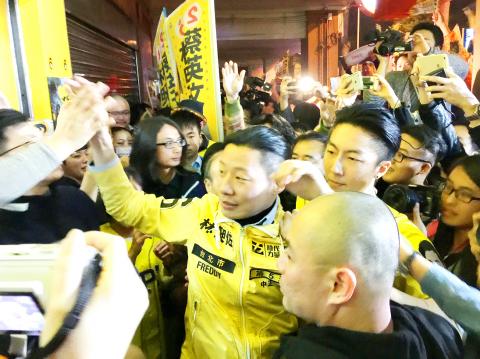The Democratic Progressive Party (DPP) yesterday won an absolute majority in the 113-seat legislature for the first time, with 60 percent of its regional legislative candidates winning in their respective electoral districts and securing more than 44 percent of the vote.
The Chinese Nationalist Party (KMT) has lost the 64-seat majority it won in 2012, retaining 35 seats in the legislature.
The newly formed New Power Party (NPP) had spectacular success, winning all three districts where it fielded regional legislative candidates and crossing the 5-percentage-point threshold to be awarded legislator-at-large seats.

Graphic: Constance Chou and June Hsu, Taipei Times
The most attention-grabbing legislators-elect are the NPP’s Huang Kuo-chang (黃國昌), Hung Tzu-yung (洪慈庸) and Freddy Lim (林昶佐), as well as the DPP’s Hsiao Bi-khim (蕭美琴) in Hualien County, who had all been predicted to have tough battles in traditional KMT strongholds.
The DPP achieved a home run in the cities and counties south of the Jhuoshuei River (濁水溪) — Yunlin and Chiayi counties, Tainan, Kaohsiung and Pingtung City — winning a total of 21 seats.
Former Taipei mayor Hau Lung-bin (郝龍斌) was defeated in Keelung by the DPP’s Tsai Shih-ying (蔡適應).

Graphic: Constance Chou, Taipei Times
In New Taipei City, which has 12 electoral districts and where KMT presidential candidate Eric Chu (朱立倫) serves as mayor, the KMT lost eight seats that it formerly held, with only two lawmakers — Luo Ming-tsai (羅明才) and Lin Te-fu (林德福) — retaining their seats.
The DPP won seven more seats than it had four years ago, securing nine seats, while the NPP secured one.
Huang, one of the leading Sunflower movement activists, defeated incumbent KMT Legislator Lee Ching-hua (李慶華), who had been elected seven times in a row, in New Taipei City’s Sijhih District (汐止).

Photo: CNA
KMT Legislator Chang Ching-chung (張慶忠), whose “30-second ramming through” of the cross-strait service trade agreement in 2014 helped spark the Sunflower movement and who was seeking his fourth term, lost his seat to the DPP’s Chiang Yung-chang (江永昌).
In Taoyuan, where the KMT had won all six electoral districts in 2012, the DPP gained three seats, while the KMT retained two and an independent won one.
DPP caucus whip Ker Chien-ming (柯建銘) snatched a seat in Hsinchu City, which had belonged to the KMT.
In Hsinchu County, former commissioner Cheng Yung-chin (鄭永金), a non-affiliated candidate supported by the DPP, was defeated by KMT legislative candidate Lin Wei-chou (林為洲).
The KMT managed to retain two seats each in Miaoli and Nantou counties.
In Taichung, the KMT won three out of eight districts — dropping from five in 2012 — while the DPP won four, with Hung winning the final seat.
In Changhua County’s four electoral districts, the DPP gained three seats, while the KMT won one, a reversal of what the two parties won in the county four years ago.
In eastern Taiwan, both electoral districts in Hualien and Taitung counties saw their respective DPP candidates elected.
The outlying islands — Penghu, Kinmen and Matsu — elected DPP, KMT and KMT lawmakers respectively.
The DPP, KMT, People First Party (PFP) and NPP were the only four parties to cross the 5-percentage-point threshold for legislator-at-large seats.
A total of 18 candidates on the DPP’s legislator-at-large candidate list secured seats with the party’s 44 percent of party representation vote.
The KMT received 11 seats through 26.9 percent of party votes.
The PFP, with 6.5 percent of party votes, won 3 seats, while the NPP garnered 6.1 percent for 2 seats.

Tropical Storm Gaemi strengthened into a typhoon at 2pm yesterday, and could make landfall in Yilan County tomorrow, the Central Weather Administration (CWA) said yesterday. The agency was scheduled to issue a sea warning at 11:30pm yesterday, and could issue a land warning later today. Gaemi was moving north-northwest at 4kph, carrying maximum sustained winds near its center of up to 118.8kph and gusts of 154.8kph. The circumference is forecast to reach eastern Taiwan tomorrow morning, with the center making landfall in Yilan County later that night before departing from the north coast, CWA weather forecaster Kuan Shin-ping (官欣平) said yesterday. Uncertainty remains and

SEA WARNING LIKELY: The storm, named Gaemi, could become a moderate typhoon on Wednesday or Thursday, with the Taipei City Government preparing for flooding A tropical depression east of the Philippines developed into a tropical storm named Gaemi at 2pm yesterday, and was moving toward eastern Taiwan, the Central Weather Administration (CWA) said. Gaemi could begin to affect Taiwan proper on Tuesday, lasting until Friday, and could develop into a moderate typhoon on Wednesday or Thursday, it said. A sea warning for Gaemi could be issued as early as Tuesday morning, it added. Gaemi, the third tropical storm in the Pacific Ocean this typhoon season, is projected to begin moving northwest today, and be closest to Taiwan on Wednesday or Thursday, the agency said. Today, there would likely

DISRUPTIONS: The high-speed rail is to operate as normal, while several airlines either canceled flights or announced early departures or late arrivals Schools and offices in 15 cities and counties are to be closed today due to Typhoon Gaemi, local governments announced last night. The 15 are: Taipei, New Taipei City, Taoyuan, Tainan, Keelung, Hsinchu and Kaohsiung, as well as Yilan, Hualien, Hsinchu, Miaoli, Chiayi, Pingtung, Penghu and Lienchiang counties. People should brace for torrential rainfall brought by the storm, with its center forecast to make landfall on the east coast between tonight and tomorrow morning, the Central Weather Administration (CWA) said. The agency issued a sea warning for the typhoon at 11:30pm on Monday, followed by a land warning at 11:30am yesterday. As of

CASUALTY: A 70-year-old woman was killed by a falling tree in Kaohsiung as the premier warned all government agencies to remain on high alert for the next 24 hours Schools and offices nationwide are to be closed for a second day today as Typhoon Gaemi crosses over the nation, bringing torrential rain and whipping winds. Gaemi was forecast to make landfall late last night. From Tuesday night, its outer band brought substantial rainfall and strong winds to the nation. As of 6:15pm last night, the typhoon’s center was 20km southeast of Hualien County, Central Weather Administration (CWA) data showed. It was moving at 19kph and had a radius of 250km. As of 3pm yesterday, one woman had died, while 58 people were injured, the Central Emergency Operation Center said. The 70-year-old